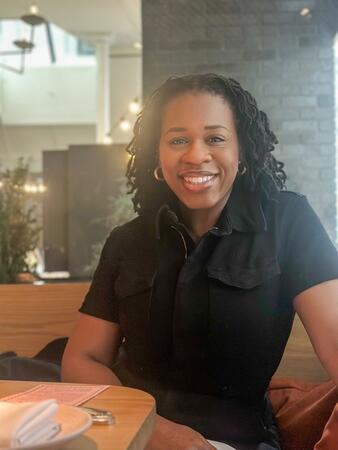A Day in the Life at Center for Hope

Welcome to A Day in the Life at Center for Hope, a blog series highlighting the dedicated professionals who support individuals and families affected by trauma, violence and loss. Center for Hope (CFH) serves as a beacon for those facing difficult times, offering essential advocacy, counseling and resources. In this series, we’ll explore the work and perspectives of those who contribute to CFH’s mission daily.
Today, we meet Mariam, manager of Program Development and Evaluation at Center for Hope. Mariam's role blends structure, resources and collaboration, and in this piece, she shares how those skills strengthen the center’s mission, support her volunteer work beyond its walls and might guide young professionals exploring this field.
Q1. Who are you, and what do you do at Center for Hope?
A. Hi! I’m Mariam, and I manage our Program Development and Evaluation team and efforts here at Center for Hope.
That means I collaborate with different teams to plan and lead initiatives, track progress toward grant goals and deliverables and oversee our client assistance efforts. I love helping programs run more smoothly and supporting staff in doing what they do best. It’s a great mix of structure, resources and collaboration—which is right up my alley.
Q2. Do you volunteer or give back to your community outside of work? If so, how?
A. Yes! I co-lead the teen ministry at my church, where I work with over 40 incredible young people between the ages of 13 and 19. It’s one of the most rewarding parts of my life. We create a space where they can feel seen, heard and empowered—whether we’re having honest conversations, planning events or just showing up for one another. Supporting youth in their growth, identity and purpose is something I’m deeply passionate about, both in and outside of work.
Q3. If you could tell someone considering this kind of work one thing, what would it be?
A. You don’t have to have it all figured out to make a difference. I started as a social worker providing direct services and gradually found myself drawn to project-based, behind-the-scenes work—and it’s been one of the most fulfilling shifts in my career. This field gives you the freedom to reinvent yourself while staying rooted in the mission. Whether you’re on the front lines or working behind the scenes, it’s all heart work. Keep growing. Invest in new skills and knowledge. There are so many ways to move this work forward, and sometimes the most powerful impact happens outside of the spotlight.
Q4. What does "hope" mean to you in the context of your role?
A. For me, "hope" is knowing that even the small things we do can lead to real change. In my role, it’s about making sure programs run in a way that truly supports people—so staff feel equipped, and clients feel cared for. It means believing that thoughtful systems, clear communication and meaningful collaboration can help create a more healing, compassionate space for everyone who walks through our doors.